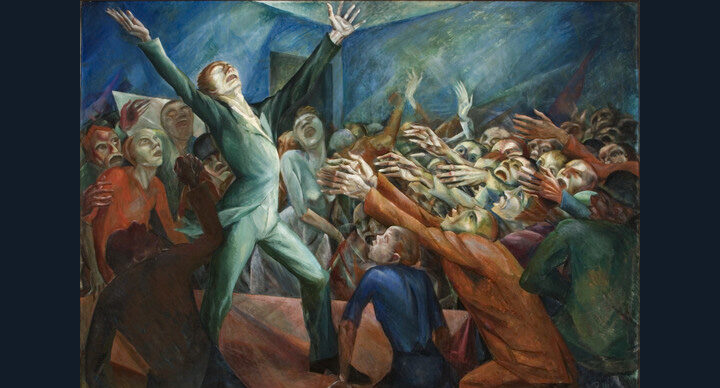What do Donald Trump, Teletubbies, Starbucks coffee cups and other forms of Christian persecution have in common? More than you might think.
As someone raised in a very conservative Southern Baptist church in Orlando, Fla. — I would not go so far as to call it fundamentalist — today I can see a direct correlation between the “teachings” of that era and Trump’s “teachings” of today.
There is a direct connection between Trump’s rallies and evangelical revivals. Although Trump’s Madison Square Garden performance was far beyond anything I ever encountered in my Baptist upbringing, his early rallies were filled with rhetoric similar to what I experienced in my teens through my late 20s.

Joe Westbury
Occasional fiery outbursts on any number of topics perceived to be threatening the free practice of my faith, linked to cries of coming persecution, gave me a dim outlook for Christianity. The tenor of manipulation I was fed is eerily similar to what I see in today’s Trump rallies.
There must be something very strange buried deep in the human psyche that fears The Other. Looking back over my life, having been raised as an evangelical, I slowly found myself in a very dysfunctional relationship with a “biblical worldview” that was clearly not comfortable living in its own skin.
I remember being taught to believe we were living just a short distance from being persecuted for our faith. Bad times were always just over the horizon and the end times were near.
Jesus Movement and youth cantatas
At the risk of being trite, it was the best of times and the worst of times. The Jesus Movement came out of nowhere in the 1960s and ’70s and a fresh outpouring of God’s Spirit spread across the nation. The era transformed our music as composers like Ralph Carmichael and Kurt Kaiser, Bury Red, Ragan Courtney and others gave us youth folk musicals — we called them cantatas — such as Tell It Like It Is, Celebrate Life, and Good News with songs like “Pass It On.”
But even though these compositions gave us a reason to embrace our faith, we were not given freedom to fully embrace those who came out of the Jesus Movement. It didn’t take long for the church, as institutional religion, to reject those whom God’s Spirit had embraced and brought into a faith free of judgment for how they looked on the outside.
“We wanted everyone in the church to look like they had just stepped out of Central Casting for a career in the service industry at Walt Disney World.”
We were taught these new Christians needed to clean themselves up and cut their hair and shave and have an outward appearance that would more closely glorify God with their witness. We wanted everyone in the church to look like they had just stepped out of Central Casting for a career in the service industry at Walt Disney World — neatly groomed, shaved, and certainly no hair over the ears.
I even remember some in the church saying with derision that some of these young men looked like Jesus with their hair as long as women. That was something else I couldn’t wrap my head around since I never saw a representation of Jesus with short hair and clean shaven. The Beatles certainly didn’t help things any.
As the church effectively killed off the Jesus Movement in the late-1970s by rejecting those who didn’t fit into our mold, it turned its attention to more pressing matters. I remember hearing — and in my innocence believing the conspiracy theory — that the United States was in such social and moral turmoil that it might not survive its 200th anniversary in 1976.

Postter for Left Behind 3 movie.
Bring on the persecution and end times theology
We were informed — incorrectly — that few countries survived two centuries of existence and there were Satanic powers afoot set on destroying our Christian nation. We were led to believe we had become like ancient Rome in its final days: wicked and rotten to the core, almost beyond God’s ability to save us from ourselves.
Admittedly, times were tough with multiple assassinations of political leaders including John F. Kennedy and Martin Luther King.
Race relations, as well, were boiling over. Race Relations Sunday, a project of visionary Southern Baptist communicator Floyd Craig, debuted in 1965. But it would take another 16 years until Michael Donald became the nation’s last reported lynching victim when he was strung up by KKK members in Mobile, Ala.
 Like many of my church friends, I was innocently caught up in the end times writing by the likes of Tim LaHaye with his Left Behind novels and Hal Lindsey’s The Late Great Planet Earth. Lindsey’s apocalyptic tome, which sold more than 35 million copies, was translated into more than 50 languages. His seven-year stint as a youth evangelist for Campus Crusade for Christ gave him the bona fides to lead astray an entire generation of us youth as well as that of our parents.
Like many of my church friends, I was innocently caught up in the end times writing by the likes of Tim LaHaye with his Left Behind novels and Hal Lindsey’s The Late Great Planet Earth. Lindsey’s apocalyptic tome, which sold more than 35 million copies, was translated into more than 50 languages. His seven-year stint as a youth evangelist for Campus Crusade for Christ gave him the bona fides to lead astray an entire generation of us youth as well as that of our parents.
And the end times timeline was bolstered even more with Israel’s stunning victory in the 1967 Six Day War in the Middle East, which was followed with conspiracy theories that it was part of God’s plan to fully restore Israel through the rebuilding of the Jerusalem temple.
We are still waiting after 57 years.
In time, the slow growth of fundamentalism talked us into giving away the hope of our salvation for the fear of our unworthiness — the modern-day sinners in the hands of an angry God. Today was bad and tomorrow would be worse due to the oncoming persecution.

Teletubbies
Teletubbies strike fear into the church
Eventually, we found new fears to justify clutching our pearls — such as Jerry Falwell teaching us that Teletubbies, those soft and cuddly aliens in children’s Saturday morning programming, were confusing our children about gender roles and one was actually gay … or as we would say then in a lowered voice … “homosexual.”
Any thinking person could easily see his purple costume and the triangle above his head was a harbinger of the Gay Agenda — whatever that was. Even the clarification by the British Broadcasting Corp., which ran the series, that all the characters had no gender and were aliens from another world made no difference to Falwell, who fanned the flames of the conspiracy.
Once again, we were remined it was Us against Them and our persecution was ever closer.
We became convinced the truth came from our pulpits and secular media could not be trusted. Why confuse us with facts of a Saturday morning children’s programming?
There were far more exciting things to worry over, such as Starbucks “declaring war on Christians” by removing all artwork of traditional Christmas symbols from their red seasonal coffee cups. No matter that Starbucks, as a secular corporation, realized it could increase its caffeine distribution by broadening its markets to those of all faiths or no faiths.
The word from Starbucks headquarters in Seattle was that the decision was not sinister about rejecting one group but about embracing all coffee drinkers to generate more profits. However, we secretly knew this was just another subtle way of persecution.
Revival preachers continued to prey on our fear and picked up the theme and spread the idea that our persecution was imminent and we as a nation were rotting from the inside.
Headed for an encounter unknown since Sodom and Gomorrah
We were told no nation ever had survived rejecting God and God’s values. We were reminded of God’s judgment against Sodom and Gomorrah. Even though historical bastions of faith such as Germany, Italy, France, Switzerland, Great Britain — who had given so much to the Christian world, not to mention the Reformation — are still chugging along centuries later.
“This is how, in the fulness of time, Donald Trump rose to be the new savior of the church.”
There are too many Christian conspiracy theories to explore that grew and blossomed in those early days and continue today. We won’t even go into the church’s chronic feigning persecution at the hands of Madalyn Murray O’Hair and her fight to remove Christian prayer from schools. That untruth was still making its rounds in the church decades after her death.
And this is how, in the fulness of time, Donald Trump rose to be the new savior of the church. While he has clearly gone off the rails more than most of us ever could imagine, his end times gospel still appeals to evangelicals writ large. Not all, I must stress, but enough to make a difference in presidential elections and for every name down ballot.
While years ago I was taught to believe in the antichrist — a highly contested and very narrow interpretation since the day the book of Revelations was written — there is one thing I never have been able to shake: Donald Trump may not be the Antichrist but he certainly is the dry run.
He is a smooth-talking politician who gives the church a reason to fear the future, to reject others who do not share your values, and to reject the idea of democracy of thought.
Truth be known, we have seen him acting just like we could expect a future antichrist to act by speaking out of both sides of his mouth. Earlier this year we heard him pandering to evangelicals by calling himself a Christian even though he told CNN during his previous run for office in 2015 that he had never asked God for forgiveness. He freely stated that if he ever did anything wrong, he always made it up to the individual.
In a later interview when asked which faith he was affiliated with, he replied he was his “own kind of Christian.” Earlier this year, he nearly begged Christians for their vote, addressing the crowd as “My beautiful Christians” to gain their favor.
Trump rallies, revivals of the 1960s through 1980s strangely familiar
That is why, in so many ways, Trump’s “preaching” and that of fundamentalist preachers are so closely intertwined. The rallies and the revivals of the past are remarkably comforting to followers. Trump, in their eyes, is the only one who can return the nation to its heyday. He is, in effect, their modern-day savior.
One of the most memorable things I carried 50 years out of my college classroom at Union University is a term I learned in Sociology 101. The FUD principle explains much of life’s problems both inside evangelicalism in general and Southern Baptists in particular.
In brief, if you want to control any group and motivate them to action, simply dwell on fear, uncertainty and doubt. It works well on those to the left and the right and, as we are seeing today, it can work on both at the same time.
Trump in particular has seized on this basic concept with his revival style rallies. He is a modern-day Elmer Gantry and Jonathan Edwards rolled into one.
And every time he speaks the crowd goes wild. That will preach.
Joe Westbury is a veteran Baptist journalist who previously worked for the SBC Brotherhood Commission and Home Mission Board and ultimately retired from the managing editor position at the Georgia Christian Index. He lives in Atlanta.
Related articles:
The Trickster | Opinion by Steve Cothran
Tucker Carlson is a danger to American families | Opinion by Mark Wingfield
Why inerrancy is a threat to democracy | Opinion by Rick Pidcock


